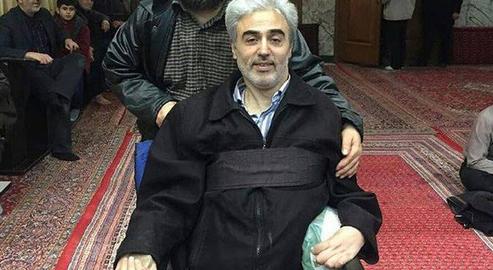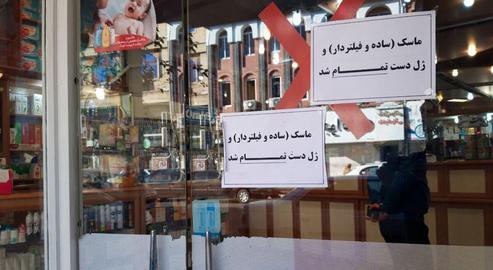Seven and a half percent of Iranians known to have died from coronavirus are war veterans, according to the latest report from the Islamic Revolution Veterans Association.
The term "veteran" is used in the rhetoric of the Islamic Republic to denote those wounded in the Iran-Iraq war. Victims of chemical attacks in the eight-year conflict, many of whom now suffer from respiratory and lung problems, are among the high-risk groups most susceptible to the worst effects of COVID-19.
But the Foundation of Martyrs and Veterans Affairs, which is officially tasked with supporting them, has so far faced little scrutiny during the coronavirus crisis. What role has the Martyrs’ Foundation played in supporting victims of chemical attacks and their families in the midst of a deadly outbreak?
***
According to recent reports there are 150,000 victims of chemical attacks living in Iran today. Around 68,000 of these individuals receive different types of medical and financial help from the Foundation, of whom a significant number are struggling with ongoing lung and respiratory problems. Official figures indicate that of these “chemical casualties”, a total of 517 are severely ill, 16,486 suffer from “moderate” sickness and 42,935 have “non-severe” symptoms.
Due to the effects of toxic gases they inhaled during the war, chemical warfare victims are more likely to contract even the most minor respiratory illnesses. These can be exacerbated during periods of intense air pollution, or when they are exposed to cold air – or, most seriously, if a viral respiratory disease breaks out.
The latter scenario has now become a reality. The coronavirus disease, COVID-19, can in some cases attack the lungs and cause severe respiratory difficulties. These individuals are therefore among the most vulnerable groups to COVID-19. According to some reports, at least 60 have died from the disease so far.
Nursing homes, where many of these chemical warfare victims reside, have been transformed into some of the most dangerous environments in the context of a pandemic. In March 2020, the Martyrs of Iran website reported that since the outbreak of the coronavirus in Iran, no action has been taken to protect those convalescing at veterans' sanatoriums.
The same report quoted a letter penned by hospitalized patients at the Tehran Rehabilitation Center. The authors called on the Martyrs’ Foundation to implement a series of preventative measures “as soon as possible”, including disinfecting the center’s private and communal spaces, providing protective gear and hygienic supplies, and providing test kits for the daily monitoring of patients. It is not known at this time how far any of the demands have been fulfilled.
In an interview with the website Martyrs of Iran, Hamid Reza Haghshenas, one of the chemical warfare victims, said the Martyrs’ Foundation had not provided support or equipment to veterans during the outbreak.
"At a time when pharmacies refuse to provide masks and gloves,” he said, “the minimum expectation of veterans is that the Martyrs’ Foundation will provide them. The foundation could at least take and fill the veterans' oxygen capsules because we can't leave the house at all."
"These days, people are so scared of coronavirus that when we go outside and cough, everyone thinks we have the virus and they run away," he said. "But a severe cough is our usual job."
Elsewhere, in a highly critical appraisal of the Martyrs’ Foundation’s performance, veterans’ advocacy group Voice of the Defenders warned: "While about 10 to 12 veterans are added to the dead every week, the Martyrs' Foundation is still trying to show that the situation is calm. There are very few who think about responding to the medical needs of veterans and chemical patients."
It added: "In recent days, many veterans have received short text messages of medical advice from the Martyr's Foundation, but is it enough to send medical advice via SMS and publish a statement in such a situation?"
Voice of the Defenders has also raised the alarm over the apparently prejudicial treatment of some COVID-19 victims in hospital. "At the IRGC Baqiyatollah Hospital,” it stated, “the priority is given to admitting clerics and members of the Majles and refusing to admit some members of martyrs’ families."
In response to the rising tide of criticism, the Martyrs’ Foundation and other organizations supporting chemical warfare victims have published a list of additional services they will provide at this time.
The measures include launching a government-assisted Coronavirus Prevention Committee, distributing disinfectants at Martyrs’ Foundation offices across Iran, issuing instructions for the prevention of COVID-19 in a variety of settings, sending advisory text messages, publishing education and training videos, distributing 10,000 packages of healthcare products to high-risk veterans, and improving medical provision to veterans in their homes.
The budget of the Martyrs’ Foundation has been set at about 33 billion tomans (USD$2.2 million) for 2020. It has never published its financial statements. But so far, the Foundation appears to only have allocated a very small amount of this funding – 3.5 billion tomans, or $234,000 – to preventing the spread of the virus and supporting veterans.
It is not yet known how many veterans have been forced to stay at home during the outbreak and therefore lost their livelihods. But the Martyr's Foundation did reveal that it has so far distributed just 75,000 packages of essentials to more than 500,000 veterans who are potentially eligible for support.
These insufficient gestures come at a time when 7.5 percent of all those known to have died from coronavirus in Iran have been veterans. Worse still, according to the same report, veterans and their families account for an astonishing 27 per cent of all those admitted to hospital.
The pandemic is far from over in Iran, and it is unclear how many chemical warfare survivors will fall victim to the virus in the fullness of time – or if the measures taken to date have been enough.
visit the accountability section
In this section of Iran Wire, you can contact the officials and launch your campaign for various problems




























comments